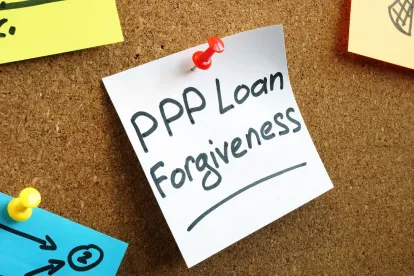The Paycheck Protection Program (“PPP”) was critical in helping small businesses stay afloat amidst the COVID-19 pandemic and resultant government restrictions on all manner of commerce. Now, as more businesses have applied for PPP loan forgiveness, some will receive notice that the United States Small Business Administration (“SBA”) is denying forgiveness of those loans. Small businesses whose PPP loans are denied will receive a letter that looks like this.
What does it mean if your PPP loan was not forgiven by the SBA? If you believe the SBA’s decision is incorrect, you may wish to appeal it. To start, the SBA has published a helpful presentation, which provides an overview of the appeals process. There are several important points you should be aware of in order to ensure your small business has the best chance of success.
File Your Appeal Timely
The regulations governing appeals of PPP loan forgiveness denials provide that the appeal petition must be filed within 30 calendar days of the small business owner’s receipt of the SBA’s final loan review decision. See 13 C.F.R. § 134.1202(a). Untimely appeals will be dismissed.
Use the OHA Portal
Appeals are heard by the SBA’s Office of Hearing and Appeals (“OHA”) and are assigned to an OHA judge. Appeals must be filed electronically through the online OHA Case Portal.
Use the Appropriate Representative
A party may represent itself before the OHA or be represented by an attorney. See 13 C.F.R. § 134.208(a). Due to the complexity of the statute and regulations governing the PPP, small businesses should consider retaining an experienced attorney to represent them for purposes of PPP appeals. However, if a small business chooses not to retain an attorney, it must be aware that only the borrower on a loan (or its legal successor in interest) has standing to appeal the final SBA loan review decision. Lenders and “individual owners of a borrower entity” do not have standing to appeal. See 13 C.F.R. § 134.1203. Rather, a “partner may represent a partnership; a member may represent a limited liability company; and an officer may represent a corporation, trust, association, or other entity.” See 13 C.F.R. § 134.208(a).
What to Include in the Appeal Petition
Be sure to include the necessary information and documents with your appeal petition, otherwise it may be dismissed by the OHA judge:
-
A copy of the final SBA loan review decision that is being appealed and the date it was received by the borrower.
-
A full and specific statement as to why the final SBA loan review decision is alleged to be erroneous, together with all factual information and legal arguments supporting the allegations.
-
The name, address, telephone number, email address, and signature of the appellant or its attorney.
13 C.F.R. § 134.1204(a)-(b).
The maximum length of an appeal petition (not including attachments) is 20 pages. Clearly label any exhibits and attachments. See 13 C.F.R. § 134.1204(a)(2).
Importantly, you must also provide your lender with a copy of the timely appeal petition so that the lender can extend the deferment period of the PPP loan until a final decision is issued. See 13 C.F.R. § 134.1202(b).
What to Expect
Once your appeal is filed, the case will be assigned to an OHA judge who will issue an Order with further instructions for the borrower and/or the SBA. Usually the SBA will have to file the Administrative Record (i.e., all relevant documents it considered in denying forgiveness of your loan) within 20 days of the OHA judge’s Order. The borrower will then have 10 days to object to the Administrative Record. After that, the SBA will have an opportunity to respond to the appeal in writing. Within approximately 45 days of the close of the record, the OHA judge will issue a decision on the appeal. The borrower has the burden on appeal to show that the SBA’s loan review decision was based on clear error of fact or law. See 13 C.F.R. § 134.1210.
The Bottom Line
If the SBA denies your application for forgiveness of a PPP loan, filing an appeal might make sense. Pay particular attention to the 30-day deadline for filing your appeal, and consider retaining an attorney to help you through the appeal process.



 />i
/>i

